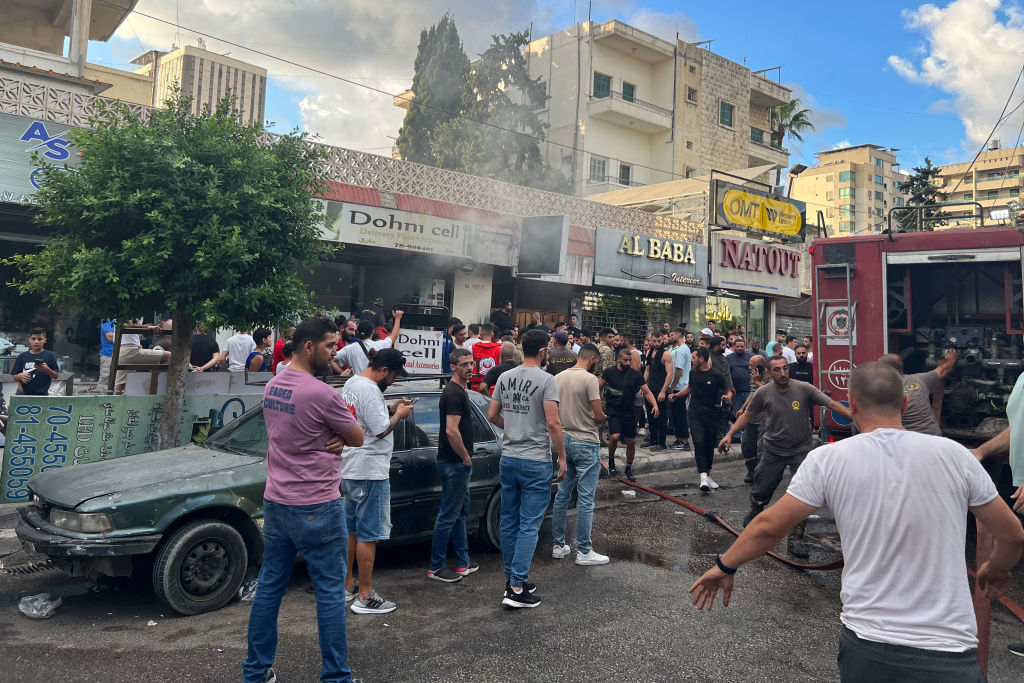How Hezbollah was humiliated
The effectiveness of the Lebanese political and military organization has come into serious question

Explosions ripped across Lebanon Tuesday afternoon as hundreds of old-fashioned pagers stuffed with an ounce or two of explosives blew up, killing twelve and injuring approximately 3,000 more. On Wednesday, the low-tech carnage resumed, with exploding walkie-talkies killing at least another twenty people and wounding an additional 450.
The targets were militants and allies of Hezbollah, Lebanon’s Shiite Muslim political and military organization which, together with a coalition of political allies, holds a majority in the country’s parliament. Hezbollah and the allied Iranian government, which heavily supports its activities, have blamed Israel, which has been in localized near-daily hostilities with Hezbollah since Hamas’s October 7 attack. Hezbollah backed Hamas in that assault and in the Palestinian organization’s ongoing war with Israel and pledged to continue fighting on its behalf until there is a ceasefire in Gaza. After increasingly frequent escalation in recent months, it has promised “terrible punishment” against Israel in retaliation for this week’s bombings.
Israel has neither confirmed nor denied responsibility, but Tuesday’s pager assault came one day after Amos Hochstein, the Biden administration’s unsuccessful mediator charged with de-escalating tensions between Israel and the militant group, met with Israeli defense minister Yoav Gallant, who told him that large-scale “military action” against Lebanon is now unavoidable. On Wednesday, both Gallant and Israeli prime minister Benjamin Netanyahu made statements suggesting the Israel is starting what Gallant called “a new phase in the war,” shifting military operations from Gaza to the country’s northern border, where the exchange of fire has displaced some 60,000 Israelis from their homes for nearly a year. This week, the Israeli government expanded its official war goals to include the return of the displaced residents to their homes.
Founded during Lebanon’s civil war in the 1980s, Hezbollah exists as a de facto state-within-a-state, fielding at least 100,000 fighters, an estimated 150,000-170,000 rockets, and other significant military capabilities. Heavily supported by Iran, Hezbollah, whose name means “Party of God” in Arabic, claims to act as a force of national “resistance” against “colonial” powers present or operating within Lebanon. Its broader operations have included the dispatch of fighters to foreign battlegrounds, including Bosnia in the 1990s and Syria from 2012 to 2015. In 2006, it was the main antagonist of Israeli forces invading Lebanon. Two years later, it defeated an attempt by the Lebanese government to take control of its separate communications network and enforced government recognition of de facto veto power over national policies and its continuing authority to offer its brand of resistance.
Lately, however, Hezbollah’s effectiveness — its only justification for the immense power it wields in a country shared with seventeen other religious sects, many of which bitterly oppose it — has come into serious question. Many Lebanese blame it for the 2020 blast that devasted central Beirut, and it has forcefully thwarted investigations into the causes of that catastrophe. After many years of stonewalling, a UN-backed special tribunal convicted several Hezbollah militants in absentia for the 2005 assassination of Lebanese prime minister Rafik Hariri, the last political figure who offered the country a semblance of unity. The pro-Hezbollah parliamentary majority has failed to repair the severe economic and political crisis that has been ongoing since 2019, a disaster that reduced more than 80 percent of the country to poverty — including many of Hezbollah’s own supporters. Since last October, Hezbollah’s running firefight with Israel has resulted in the displacement of about 100,000 Lebanese citizens from their side of the border, often in conditions of terrible wont in an already deeply impoverished and dysfunctional country.
No one is entirely sure how the low-grade electronic devices were rigged to explode or by whom, but the fact that they were booby-trapped in such large numbers and to such wide effect has humiliated Hezbollah and made a mockery of its claim to lead the resistance in Lebanon. In addition to its inability to defend its own militants from death and injury on a mass scale, the low-tech means it has long prided itself on successfully using against its hi-tech enemy to the south were themselves weaponized against it in what is shaping up to be a reverse David and Goliath story. “Hezbollah and Iran’s bravado was put to the test and found wanting,” Hicham Tohme, a Lebanese political analyst who now lives in the United States, told me. “Hezbollah is clearly disoriented after [Wednesday’s] strikes… they’re at a loss.” Everyone else,” Tohme says, is displaying “respectful schadenfreude.” How respectful that schadenfreude will remain when Israeli tanks cross the border is anyone’s guess.
Their effectiveness is unquestioned.
ReplyDeleteRemember that Hezbollah and Hamas have different criteria for victory than Israel.
For Hamas, it's survival. The war ends, Gaza is in ruins but SInwar comes out of hiding and announces "You see! I'm still here! Hamas is still here! And Biden says we get to run Gaza again!"
For Hezbollah, it's destroying as much of Israel as they can while using the Israeli destruction of Lebanon as a propaganda tool. A smashed Hezbollah surrounded by smoking ruins in Lebanon and Israel is a victory for them. And they still have the weapons to pull it off.
Modest proposal: Contract the Shin Bet and Mossad from Israel to protect Donald Trump, and then dismiss all of the Secret Service people:
ReplyDeletehttps://www.i24news.tv/en/news/israel-at-war/artc-israeli-recruited-by-iran-arrested-after-plot-to-kill-netanyahu-gallant